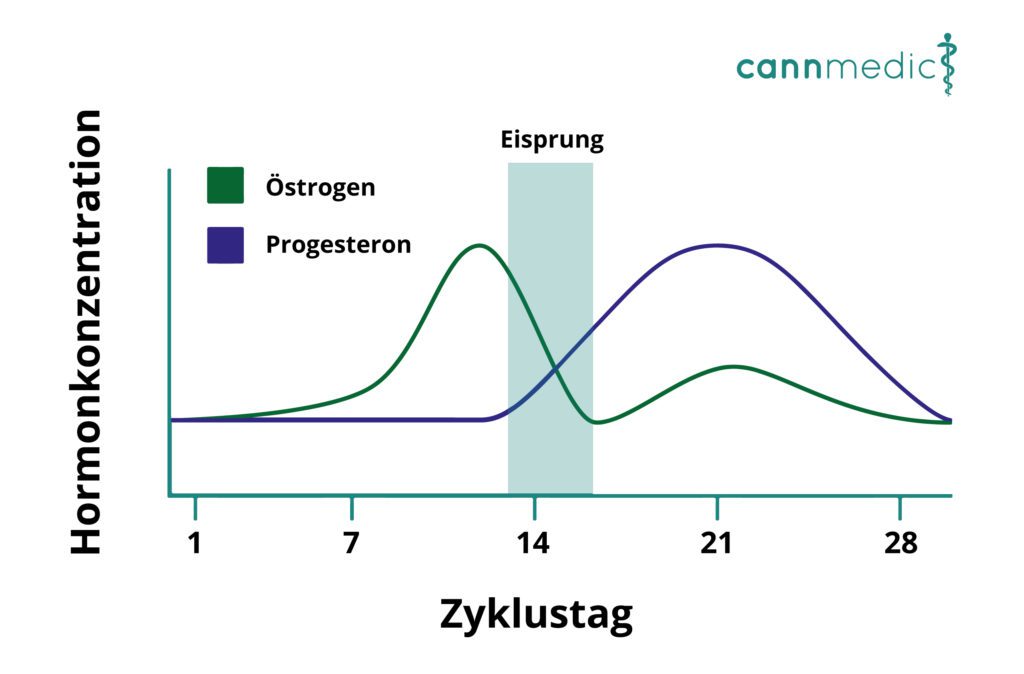PMS / PMDS - Premenstrual syndrome
Premenstrual syndrome (PMS) is an accumulation of physical and psychological symptoms that occur a few days to two weeks, i.e. in the second half of the cycle, before the onset of your period.
PMDS - Premenstrual Dysphoric Disorder
Severe PMS with a clear influence on the psyche - such as depressive moods and anxiety - is referred to as premenstrual dysphoric disorder (PMDS).

Did you know?
PMS often causes women to feel exhausted, insecure, listless, irritable or angry in the time before their period. Some women have problems concentrating as well as severe mood swings. A perceived loss of control over the body and feelings is reported. Pronounced PMS symptoms severely restrict the daily lives of affected women. This often has a negative impact on relationships within the family, with friends and at work.
What are the causes of PMS?
All the causes of PMS have not yet been conclusively clarified. However, scientific findings suggest that hormonal fluctuations during the female cycle play a role. Women with PMS do not necessarily have altered hormone levels compared to women without PMS, but are particularly sensitive to the release of progesterone. The hormone is mainly produced in the second half of the cycle before the onset of menstruation and, in addition to its actual function during the menstrual cycle and during pregnancy, also has an effect on certain receptor groups in the brain. It has been shown that both progesterone and metabolites of progesterone (e.g. allopregnanolone) influence the formation of extrasynaptic GABAA receptors and modulate the effect of GABA at these receptors. This appears to be a natural process designed to ensure a certain balance of neuronal excitability even during hormonal fluctuations. In women with PMS, these changes in neuronal excitability are particularly noticeable.
Other interactions between progesterone and messenger substances in the brain are also suspected. Tissue hormones, including tryptamines such as serotonin, also play a role here. The influence of the endocannabinoid system (ECS) in the regulation of neuronal excitability and modulation by steroid hormones also plays a central role. Stress and the resulting formation of cortisol also influences progesterone production, which can lead to an increase in symptoms. The exact mechanisms are currently being researched. Both genetic predispositions (familial influences) and environmental factors (epigenetic influences) influence the development of PMS. Furthermore, natural cannabinoids such as cannabidiol (CBD) also have the ability to modulate extrasynaptic GABAA receptors and thus provide a possible therapeutic potential for PMS (Schmiedhofer et al. 2022).
How common is PMS?
Most women experience some mild PMS symptoms in the period before their period. However, this does not usually have a detrimental effect.
Aber rund 30 % aller Mädchen und Frauen haben stärker ausgeprägte PMS-Beschwerden, die ihren Alltag beeinträchtigen.
Bei ungefähr 5 % der Frauen sind die Symptome – besonders die psychischen Probleme – so stark, dass sie starke Beeinträchtigungen erfahren (PMDS).
How does PMS progress?
PMS symptoms occur in the second half of the cycle after ovulation. It is only during this time that the body produces more of the hormone progesterone, while at the same time the female sex hormone oestrogen decreases. Shortly before the onset of menstruation, progesterone release stops.
When the menstrual period starts and a new cycle begins, the PMS symptoms subside again. By the end of the period at the latest, the symptoms of PMS have completely disappeared again and only reappear after the next ovulation.
The symptoms can vary both between cycles and over the years. The severity of the symptoms can vary greatly depending on the cycle and can also change over the years. It is difficult to predict how the symptoms will develop. However, they disappear at the latest with the last menstrual period during the menopause, as the hormonal fluctuations then no longer occur.
What are the symptoms of PMS?
Physical symptoms:
- Sleep disorders
- Headaches or migraines
- Digestive complaints (diarrhoea, flatulence, constipation, bloating)
- Breast tenderness, painful or swollen breasts
- Bleeding disorders, spotting, prolonged cycles, intermenstrual bleeding
- Circulatory problems (dizziness, tiredness)
- Pain in the back and joints
- Weight gain and water retention
Psychological symptoms:
- Mood swings
- Tension, nervousness and inner restlessness
- Anxiety and panic attacks
- Aggressiveness, outbursts of anger
- Grief, hopelessness and depressive moods
- Concentration disorders
- Impairment of short-term memory
- Insecurity and feelings of guilt
- Weight gain and water retention
- Cravings
- Noise and light sensitivity
CANNEFF VAG SUP
CANNEFF VAG SUP with 100 mg CBD per suppository offers quick relief from pain and vaginal discomfort.

